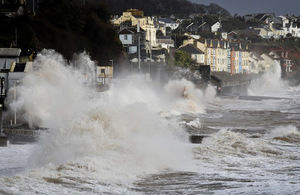Climate change challenges set out in new national assessment
The Climate Change Risk Assessment will be followed by the National Adaptation Programme setting out how government addresses these risks.

Extreme weather affecting coastal communities
The climate change challenges facing the UK economy, environment and public health have been laid out in the government’s latest Climate Change Risk Assessment, published today.
The UK Climate Change Risk Assessment 2017 continues the government’s ongoing commitment to ensure the country can adapt to a changing climate, and will be followed by the second National Adaptation Programme setting out how the government will be addressing these risks.
The new report recognises how the trend towards warmer winters, hotter summers and changing rainfall patterns is affecting communities across the UK and sets out the government’s ongoing investment and work to tackle these risks.
Defra Minister Lord Gardiner said:
Our changing climate is one of the most serious environmental challenges that we face as a nation and that is why we are taking action, from improving flood defences across the country to securing our critical food and water supplies.
The latest assessment will help us develop our long-term programme to tackle these risks so we can continue our work to protect the nation better today and for future generations.
The UK has already made considerable progress since the first National Adaptation Programme in July 2013, including:
-
Investing £2.5 billion over six years to improve flood defences, to better protect over 300,000 homes.
-
Updating the Heatwave Plan for England to protect the population from heat-related harm to health.
-
Strengthening planning policy to make clear that sustainable drainage systems should be included in all major new developments, unless demonstrated to be inappropriate.
-
Placing a new resilience duty on Ofwat through the Water Act 2014 and publishing the Enabling Resilience in the Water Sector report to ensure the long-term resilience of water and sewerage services.
-
Maintaining over 95% (by area) of England’s Sites of Special Scientific Interest (SSSIs) at ‘favourable’ or ‘recovering’ condition, and establishing 50 Marine Conservation Zones with 34 new byelaws to protect them.
-
Working closely with the food industry to ensure the security and resilience of food supply, using the latest technology delivered through the new Agri-Tech Innovation Centres.
-
Constructing a UK Plant Health Risk Register to compare the risks posed by different plant pests and pathogens.
-
Committing to develop a 25 year environment plan that takes climate change into account.
The Climate Change Risk Assessment, drawing primarily on the independent evidence report published in July 2016 by the Adaptation Sub-Committee of the Committee on Climate Change, will be followed by the National Adaptation Programme to be published in 2018.
Alongside our strategy to adapt to climate change risks, the government is also fully committed to tackling the causes of climate change and reducing the threat it poses to our national and economic security. This is why the UK ratified the Paris Agreement, the ambitious global deal to cut CO2 emissions, so that we can help to accelerate global action on climate change and create a safer, more prosperous future for us all.